- Home
- Christopher Rice
The Vines Page 9
The Vines Read online
Page 9
“In your eyes, maybe. But he doesn’t get paid more than one.”
“You know what I mean.”
“I do. And you’re wrong. We’re not her family. We never have been. We’ve worked every party she’s had. We’ve never been guests. Not once.”
She has spoken a truth about their position at Spring House that he acknowledged silently to himself a long time ago, and then rationalized away with glib self-assurances that Willie and Nova felt included and somehow affirmed by the company of wealthy white people.
It also dawns on him that, despite their pact in the gazebo as children, he isn’t necessarily family either. Caitlin’s slap earlier that night was proof of that. Maybe if he’d accepted Alexander Chaisson’s insane offer when he was fourteen, they would all be better off. Maybe he and Caitlin would be trapped in a loveless marriage defined by self-loathing and deceit, or maybe not. Maybe they would have worked out some mutually beneficial arrangement. Maybe he never would have fallen in love with John Fuller ,and Caitlin never would have been betrayed by Troy. Or maybe his thoughts are now as crazy as Caitlin’s recent behavior, and he should consume something that isn’t mostly sugar or caffeine.
“Are you all right?” Nova asks.
The effort it’s taken not to laugh at his inane speculation has left a strained half smile on his face that probably makes him look drunk, which is exactly what he’d like to be. “Booth?” Blake asks.
Nova nods, collects the papers in one hand, then hooks the strap of her book bag with the other. They cross the tiny restaurant together, heads bowed and brows furrowed, as if they’re doing so at the order of a demanding school teacher.
Once they’re sitting across from one another, he can see what her profile didn’t reveal: eagerness, anxiety, a desperate need to have her fears confirmed. After all, she was the one who gave him the order to infiltrate Caitlin’s home in search of some impossible blossom. The flower he tried to grab didn’t quite fit Nova’s description, but Caitlin’s behavior was stranger than any otherworldly plant.
When Nova senses his hesitation, she says, “I’m sorry about what I said . . . about John.”
Blake is startled into silence by her use of John’s first name. As far as he knows, Nova never met or laid eyes on John Fuller. She was just a girl when he was murdered, and his relationship with Blake—their secret trysts and desperate make-out sessions; those late nights when John would call Blake and not say anything, just play that new Faith Hill song everyone was so crazy about into the phone; their fumbling sexual experimentation in the shadows of the Lake Pontchartrain levee just a few blocks from Blake’s home—had no public face until after John’s murder.
“What did you say?” he asks.
“The thing about losing the man you loved. It was . . . it was probably more than I should have . . .”
“It’s just the way you said his name. It kind of caught me off guard is all,” he whispers.
“We went to the funeral. I remember, ’cause Daddy took me out of school.”
Blake is sidelined by this, more so than by Caitlin’s precise slap. He tries to recall the rows of mourners packed inside the Unitarian church John’s mother had been forced to pick for the service. While there was a good chance her parish church would have overlooked the facts of the case and given her son a proper Catholic burial, by then Deborah Fuller had become an unlikely and hastily assembled gay rights activist whose every public move was scrutinized by a variety of national media outlets. She and Blake were clinging to each other for support every time the cameras swung in their direction, each shot giving credence to the illusion that Blake had been a son-in-law and not a secret.
Now Blake scans the rows of mourners in his memory, searching for a younger, leaner Willie, clean-shaven and muscled as he was in those days, and his bright-eyed young daughter, her hair fastened in two matching braids. Perhaps they were jammed in the back somewhere, or perhaps his memory isn’t what it used to be, because he doesn’t see them. And he can’t recall the funeral with the same clarity with which he sometimes dreams it. All he sees are the stunned faces of his fellow students . . . and Vernon Fuller—John’s father, Coach Fuller, as he was known to all of their classmates—practically curling into a ball, reeking of bourbon, retreating silently yet entirely from the media spotlight and its incessant demand that he publicly accept his son’s secret life with as much chin-up determination as his wife.
Blake tries to take a breath, but it feels as if his nostrils have been plugged once again with the gauze he woke up with the night of the murder. And then he is blinking back tears, and Nova has bowed her head at the sight of them.
These are the moments when the sense of loss sneaks up on him. He can spend hours lighting candles at John’s mausoleum, engage in all manner of planned rituals designed to purge himself of sadness, and the tears won’t come. Rather, it is in these moments of fatigue and distraction that the grief overtakes him. He knows it’s childish, but there is a belief in him that ever since that terrible night, his is a life half-lived, a desiccated alternative to the fantasies he and John whispered as they held one another on grass kissed by hot winds off the lake. Who cares if the life they plotted for each other once they were free of high school had been nothing but teenage fantasy, devoid of accountability or consequence? That lesson should have been theirs to learn.
“I didn’t know you were there,” he manages quietly.
“We were in the back. Daddy, he thought it was important that we went. Not just for you. But ’cause the . . . you know, so people could see . . .” There’s a bitterness in her voice now, and after a few seconds of tasting it, Blake is able to identify its source. Nova’s father wanted them at the funeral because John’s murderers had been black.
Delray Morrison and Xander Higgins. Their mug shots are emblazoned in Blake’s memory with greater clarity than the funeral. Blake had sensed the presence of another assailant that night but he hadn’t seen one with his own two eyes. In light of the head injuries he’d suffered during the attack, he wasn’t willing to cast further doubt on his testimony by insisting on the presence of a ghostly third attacker. Besides, the evidence that Morrison and Higgins had acted in concert was almost impossible to argue with.
It was Troy Mangier, then a young Jefferson Parish sheriff’s deputy, who had thought to look into several attempted carjackings in Jefferson Parish reported in the weeks before the murder.
Barely a week after John was killed, Troy pulled over two young black men who were carrying materials in their trunk that matched the bindings used to lasso John and Blake to the foot of the electrical tower. The brazenness of this, cruising through the same part of town where they’d committed a deadly assault just a few nights before, would be used by the prosecution to paint both men as remorseless killers.
But they pleaded their innocence until the very end. Didn’t even try to go for a lesser charge. Didn’t try to convince the jury that John’s death had been unintentional. Just kept saying it wasn’t them.
And in a way, they hadn’t been lying.
After all, it was the water that had really killed him. The water that had risen around them with the silent determination of smoke filling a room.
Technically, John Fuller’s murderer was a pumping station, a nondescript one-story white building that plugged a hole in the levee where one of the drainage canals dividing Jefferson Parish entered the lake. You weren’t supposed to swim in Lake Pontchartrain; the water was too polluted, and boats didn’t launch from that spot, so almost no one—not even the affluent white families that lived just on the other side of the levee’s green rise—were all that familiar with the exact rise and ebb of the water along the rocky shoreline, particularly after dark.
The autopsy suggested John’s head injury was so severe he might have wound up in a coma even if Blake had been strong enough to free him before he drowned. But it didn’t matter. The
feel of the rope through his desperate, prying fingers, the weight of John’s body, all of it thrummed within Blake like a second heartbeat as he spent hours in the gym, turning himself into a tower of muscle that at present was just shy of cartoonish and a few years away from grotesque.
Delray Morrison. Xander Higgins. They’d made the mistake of forcing a lousy public defender to try to prove they were never there at all, and they’d lost. And now they were dead. One shanked in the prison yard, the other dead of a drug overdose in his prison cell.
Now they seem to hover over the table between Blake and Nova like entangled spirits, and Blake wonders if this is sign of growth on his part, that he can actually feel concern for how Nova might feel that the men who murdered his first boyfriend were black.
“Nova . . .”
“What?”
“You know, I don’t . . . That I never . . .”
“You never what?”
Never held it against you? Your race? How could he say that without sounding like a complete ass? How many times he gritted his teeth in anger over the years when his devout Catholic colleagues would say things like, You’re not like those other gays, Blake. And his people hadn’t been enslaved for hundreds of years.
“It means a great deal to me that you were there,” he finally says. “That’s all . . . It means . . .” She’s watching his face intently, but she’s withdrawn her hands from the edge of the table as if she fears his emotions might require a small seizure to get free.
“So,” she finally says, “I take it things didn’t go so well with Caitlin.”
She’s waited a respectful amount of time to say them, but her words still feel like a dismissal. Is she as uncomfortable with forced moments of so-called understanding between races as he is?
“She slapped me,” Blake finally says. He feels strangely as if he’s just betrayed some sort of confidence, and it gives him a slight taste of what abused spouses must sometimes feel.
“Why?”
“Because I tried to take it with me.”
“The flower?” Nova asks, sitting forward, as bright-eyed and eager as he’s ever seen her. “It’s there? You saw it?”
“It wasn’t glowing. But whatever it was . . . it didn’t look right. Out of proportion. Strange. I don’t know . . . What matters is she didn’t want me going anywhere near it. Listen, I went online before I left the house, and there are all types of hallucinogenic plants out there. But not the kind you can just get exposed to. You have to either eat them or smoke them or—”
“You think I hallucinated it? You just saw it yourself.”
“Yeah, I did, and it wasn’t glowing. So maybe it’s mind-altering in some way if you’re exposed to it in—”
“I saw it for thirty seconds through a door. I didn’t touch it, didn’t smell it. My daddy was closer, and you heard what he thought when I talked about the flower. I wasn’t hallucinating, Blake.”
“Fine, but maybe Jane Percival was when she killed Troy.”
“Then where is Troy’s body?”
“I don’t know.”
“So you’re gonna blame Caitlin’s crazy on some flower that’s making her hallucinate? You think that’s why she slapped you?”
“I think she’s falling apart. I think she’s been falling apart for a while—since even longer than all this started—and there’s not much I can do about it.”
“Kinda hard to blame a flower then, isn’t it?”
Blake has no response to this. Finally he points to her pile of papers. “Your research?”
Nova chews her bottom lip for a second. He figures she wants to press him for Jane Percival’s last words. But he’s already given her an intimate look inside Caitlin’s home and deteriorating mental state. It’s quid pro quo time, and he isn’t budging.
“So Spring House allegedly burned down in 1850—”
“Wait a minute. Allegedly? Felix Delachaise got wasted and burned it down because he was broke. He couldn’t manage the fields. An entire cane crop died on him, and he lost his shirt. Didn’t his whole family die in the fire?”
“Allegedly. There are those who claim something else happened—something that had nothing to do with Delachaise and booze.”
“So, wait. The family survived?”
“No. I’m saying they might have been killed by something more than a fire.”
“OK . . . And who exactly believes this?”
“The slaves who fled that night.”
“I see. So you found them all on Facebook?”
She rolled her eyes. “Close. Dr. Taylor found them on the Internet, in a manner of speaking, that is. She’s one of my professors at LSU. She’s working with a couple other universities to create something called the Lost Voices Project. It’s the most extensive database on African American slaves ever built.”
“What is it? A list of names?”
“Oh, it’s a lot more than that. There’s a professor down in New Orleans, Gwendolyn Hall, she went into old slave auction records and put together an exhaustive list of slave names and identities. Dr. Taylor, she’s building on top of that kind of research. Only all sorts of information goes into the system. Slave narratives taken before and after the Civil War. Diary entries from plantation owners. Travel logs, newspaper reports from the period. All of it gets filtered through algorithms and computer software that work to assemble a complete reconstruction of every slave. I mean, even down to their physical appearances, their mannerisms, their speech patterns. The eventual goal is to have a database where you can actually sit there and have a conversation with a slave. But that’s years away.”
“Virtual slaves . . .”
“Virtual ghosts. Back from the dead. Folks whose lives were ignored and tossed aside in the history books. Now they’re coming back to life ’cause of the kind of computer software that tracks what you buy on the Internet.” Nova’s excitement over her professor’s vision has her excited, straight-backed, and talking with her hands. She catches herself with a quick but deep breath and forces her hands to her lap. “I mean . . . it’s in the early stages. But she let me use it anyway.”
“Use it . . . how?”
“I searched for Spring House.”
“And that’s how you found these slave narratives?”
“Yeah. They weren’t all in one place until a few months ago. This project has assembled old documents that were scattered in archives all over the world.”
“OK. And these slaves . . . what did they say?”
“They said the earth took Spring House,” Nova answers. “The justice of the earth.”
“Those were their words? The justice of the earth?”
She nods. “And they all mentioned one name. Virginie Lacroix.” The French pronunciation—ver-jun-ee—rolls effortlessly off her tongue.
“Was she related to Felix?”
“Nope. She was a slave. A slave who could talk to the soil.”
“What, like . . . voodoo?”
“No,” Nova says, with evident distaste for the cliché. “There’s no mention of Afro-Caribbean spiritual practices. No altars. No chickens getting their heads cut off. This is much more specific. She could make things grow. That’s what they said. And apparently . . . she could also make them die.”
“What?” Blake asks, incredulous.
“Seriously,” Nova says. “There was a story passed among the slaves, and it was in all the accounts that came back when I did the search. They knew about Virginie’s power, but the belief was that she didn’t have control over it. She could use it in short bursts here and there but nothing that could have freed her or caused an uprising. Anyway, Delachaise was a terrible manager. A lot of the plantation owners were. Spoiled little French brats who weren’t prepared for how labor-intensive cane harvesting was going to be. There wasn’t much turnaround time each year before the winter frost
s came, and there was also the refinement process and all that. Anyway, to make up for how overwhelmed he was, Felix worked his slaves half to death. So Virginie showed him what she was capable of.”
“And . . . what? Killed him?”
“No, once he found her out, they made a deal. He asked her to make the cane grow faster. In exchange he’d add enough new slaves to lessen everyone’s workload. In other words, he promised to stop working everyone half to death if she’d use her magic on his fields.”
“Did she agree?”
“Sort of. Enough, at least, for her to grow the cane. But it sounds like he didn’t hold up his end of the bargain. Because the whole thing didn’t end well.”
“Justice of the earth . . .”
“Three different narratives in the database said something came up and out of the earth and literally tore Spring House apart. The fire happened second. But whatever happened first—it was so goddamn bad, nobody cared when all the slaves took off for the swamp.”
“Something Virginie made come up out of the earth?”
“Or something she unleashed by mistake.”
Blake sits, thinking it over. Finally, still shaking his head, he says, “And we’re the first people to read this?”
“No. We’re just the first people not to dismiss it as the voodoo mumbo jumbo of a traumatized people.”
But she’s got more than words to present. The sketch she places in front of him is a pixelated scan of a crude ink drawing. The grand facade of Spring House is plainly visible in the background, but it’s not quite to scale with the clump of stick-figure slaves standing in the foreground next to a giant oak tree. One of their own is lassoed to its giant trunk in a manner that wouldn’t be possible in real life, given the tree’s size. The overseer’s whip has been caught in midair by a giant snake that’s unfurled from one of the branches overhead. But it has no eyes, no flickering, cartoonish tongue. But if it’s not a snake, then it has to be . . .
Blake knows this is the part where he should continue shaking his head in disbelief, dismissing the story as the childish folklore of a primitive and uneducated people. But he can no longer muster such a reaction, and so he sees Nova softening before him as she realizes she won’t have to mount a stronger defense of this incredible tale.

 Blood Victory: A Burning Girl Thriller (The Burning Girl)
Blood Victory: A Burning Girl Thriller (The Burning Girl)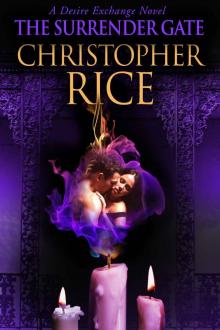 The Surrender Gate: A Desire Exchange Novel
The Surrender Gate: A Desire Exchange Novel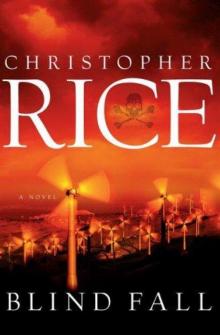 Blind Fall
Blind Fall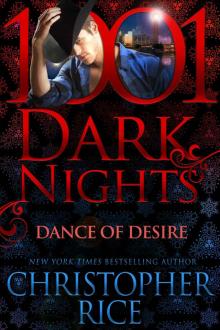 Dance of Desire (1001 Dark Nights)
Dance of Desire (1001 Dark Nights)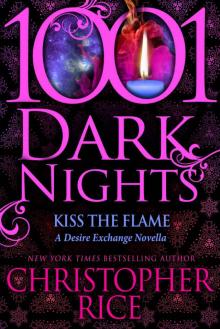 Kiss The Flame: A Desire Exchange Novella (1001 Dark Nights)
Kiss The Flame: A Desire Exchange Novella (1001 Dark Nights)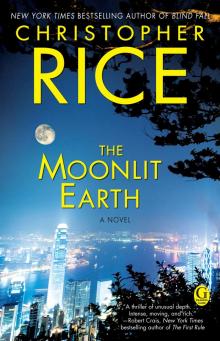 The Moonlit Earth
The Moonlit Earth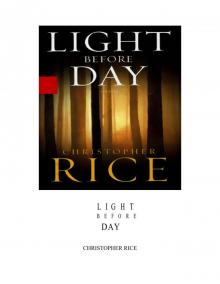 Light Before Day
Light Before Day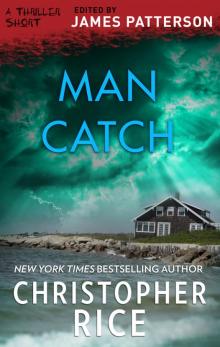 Man Catch
Man Catch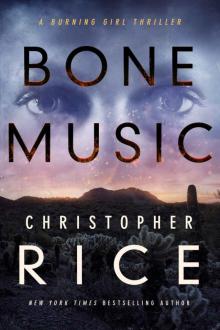 Bone Music
Bone Music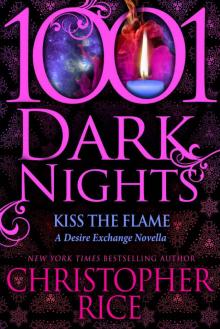 Kiss The Flame_A Desire Exchange Novella
Kiss The Flame_A Desire Exchange Novella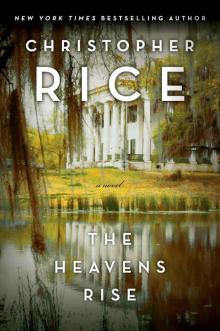 The Heavens Rise
The Heavens Rise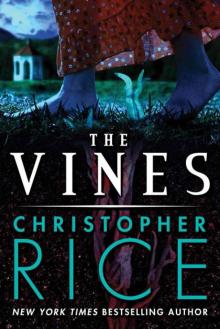 The Vines
The Vines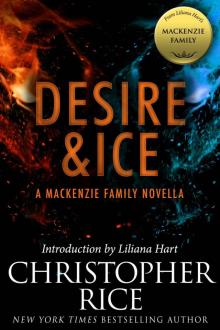 Desire & Ice: A MacKenzie Family Novella (The MacKenzie Family)
Desire & Ice: A MacKenzie Family Novella (The MacKenzie Family)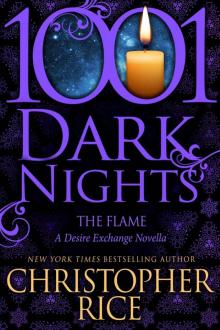 The Flame: A Desire Exchange Novella (1001 Dark Nights)
The Flame: A Desire Exchange Novella (1001 Dark Nights) The Snow Garden
The Snow Garden